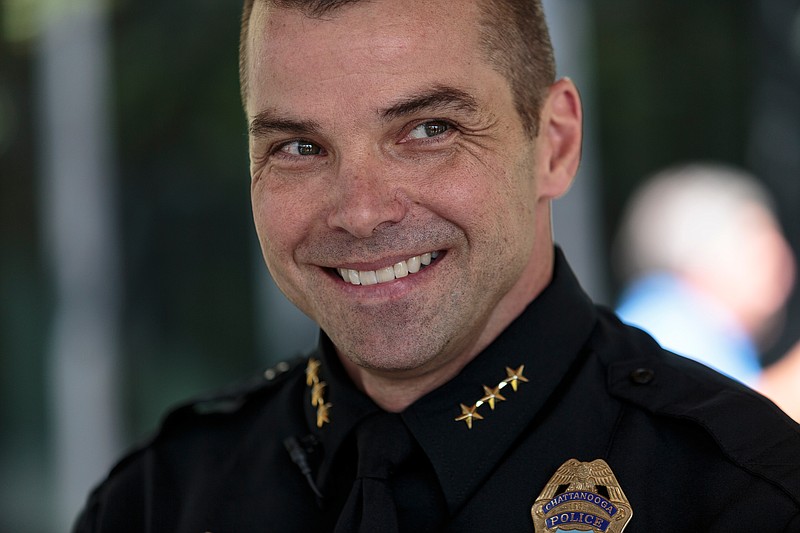UPDATE: The City Council ratified David Roddy as Chattanooga's new police chief on and 8-1 vote, with Russell Gilbert opposing.
___
ORIGINAL STORY: For the second week in a row, Chattanooga City Councilwoman Demetrus Coonrod has raised questions about David Roddy, Mayor Andy Berke's choice as police chief.
The city council votes tonight whether to ratify Roddy, one of three finalists out of 49 applicants who applied to follow Fred Fletcher, who resigned as Chattanooga's chief of police at the end of his contract in early July. Roddy, who served with the department for over two decades, now serves as its acting police chief.
At Monday's council afternoon agenda meeting, she cited "a disturbing phone call" from an unnamed person involving Roddy's connection to Mike Williams -a former Chattanooga police officer who now serves as the chief of police for Signal Mountain - "and his relationship to previous background in the case of Wadie Suttles."
Suttles died in police custody on Dec. 6, 1983, according to newspaper archives. Records show the 66-year-old black man jumped from a bed at Chattanooga City Jail, striking the concrete floor with his head. His brain swelled and he later died.
His daughter, Maxine Cousin, helped filed a complaint in 2010 with the United Nations Human Rights Council against the U.S. Department of Justice because it did not prosecute suspects for deaths of people in Chattanooga police custody. The complaint named Williams as one of the officers responsible for her father's death.
At the time of the filing, Williams said he had been investigated by the Federal Bureau of Investigation and no wrongdoing had been found.
"The person is really disturbed by the relationship between Chief Roddy and Mike Williams, and I would like to know the extent of their relationship," Coonrod said.
Coonrod did not elaborate about the phone conversation after the meeting.
Last week, Coonrod asked whether Roddy sported a white supremacist tattoo.
During a 40-minute city council question-and-answer session with Roddy, she said she wished he had worn short sleeves so she could see a tattooed "1*" on his arm, adding she was told that it was an Aryan Nation symbol. She indicated someone had bet her it was, while she said she had bet it wasn't.
"I was challenged that I wouldn't ask him [Roddy] if he was part of the Aryan Nation," Coonrod said. "I asked and they were wrong."
The "1*" tattoo is an international law enforcement symbol which means "one ass to risk," Roddy said. It serves as a personal reminder to put oath and safety first and "that we are the ones who are responsible for what we do."
Most of the last week's discussion, however, focused on Roddy's policy views.
Councilman Chip Henderson asked about how the police department will prevent officers from leaving after investing money and time in training them.
The first part of the solution calls for crafting an internal message so that officers who want to leave for other law enforcement agencies understand the long-term consequences, Roddy said. That comes down to showing them what their pay scales, benefits and chances of promotion will be in comparison to the opportunities within the Chattanooga Police Department.
"So, it's getting the internal message out to our officers to show how green our grass is, instead of what they may believe is somewhere else," Roddy said.
The other part of the solution involves a proposed employment contract, which requires officers to pay back training costs - not salary or benefits - if they leave the department within 24 months. The agreement may involve pro-rating reimbursement based on time served and should include some exceptions, such as family illness or an unavoidable relocation.
"We would never knowingly want to punish someone for wanting to take care of their family or improve themselves, but we also believe they have a responsibility and an oath they took to us and we would like to hold themselves accountable to that," Roddy said.
Councilman Ernest Oglesby questioned Roddy about efforts to diversify the department.
Roddy said the police department seeks to better understand and remove barriers to those who want to join the force. That involved a lot of one-on-one follow-up phone calls to cadets who fell short of qualifying in a previous police academy.
As a result, the next academy -scheduled for late August - "potentially has about [a] 61 percent white, 31 percent African-American and 9 percent Hispanic ratio," Roddy said.
Contact staff writer Paul Leach at 423-757-6481 or pleach@times freepress.com. Follow him on Twitter @pleach_tfp.
